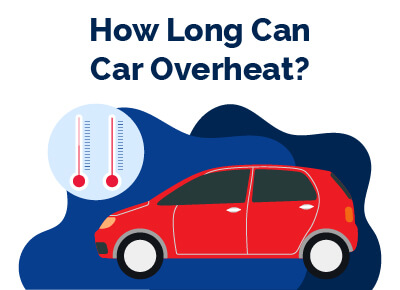How Long Can a Car Overheat Before Damage Occurs?
July 22, 2023


Chris is Head of Content for FindTheBestCarPrice and is based out of Philadelphia, PA. As a seasoned automotive industry analyst and car enthusiast, he ensures the highest level of quality across all our content and curates our picks for the best deals each month.
Chris studied information systems and marketing at Drexel University and writes about a wide range of topics ranging from car buying tips to troubleshooting common mechanical issues.
When he’s not thinking about cars, he likes to stay in with his dog and make an “attempt” to finish a crossword puzzle (he’s not quite at the Saturday/Sunday level…yet). As a former cheesemonger, Chris still has a “sharp” passion for all things cheese, and his fridge is always loaded with it!
Chris also has a passion for things that go fast, and drones are no exception. He spends some of his time writing for Dronesourced.
The functionality of your automobile’s motor is confined to a specific temperature span. When this range is surpassed, there is a high probability that the engine will overheat, resulting in destruction and calling for a replacement.
Despite the critical consequences of engine overheating, some drivers trivialize its effects, believing they can continue driving for extended periods. But how long can a car overheat before damage occurs?
Let’s answer this question in detail and also discuss some of the various symptoms of engine damage from overheating and the causes of overheating.
Let’s get started!
Table of Contents
How Long Can a Car Overheat Before Damages Occur?
The onset of engine harm due to overheating is imminent, taking only a brief period.
According to experts, an overheating engine can only run for about a quarter mile or 30-60 seconds before permanent damage occurs. This short duration necessitates prompt action to safeguard the engine’s interiors.
These damages may include the piston rupture, seizure of valves, or breakage of the engine, and the subsequent repairs could result in significant expenses.
It is a common misconception that several minutes of overheating is necessary for damage to occur. However, even a few seconds of excessive heat can cause catastrophic harm.
Therefore, if the car is slightly overheating, it is crucial to pull over and let it cool down, as there is a significant difference between a temperature that exceeds a few degrees and one that exceeds the ideal level by a hundred degrees.
Symptoms of Engine Damage from Overheating
It takes a short period for a car engine to be damaged by overheating. Here are the symptoms to look out for:
1. Coolant Leak
Detecting a coolant leak in your vehicle could indicate that the engine temperature isn’t regulating correctly. It’s essential to check the current coolant levels and inspect for potential damage.
The antifreeze fluid color can vary depending on your vehicle’s type, so it's best to seek a mechanic's assistance if you’re uncertain about the leak's origin.
2. Knocking or Ticking Sounds
Mysterious ticking sounds emanating from the engine may result from a lack of lubrication caused by overheating. Oil is engineered to flow at specific viscosity and within a certain temperature range.
If the oil gets too thin due to excess heat, the engine components may not be adequately lubricated, leading to wear and tear and potential damage.
3. Low Oil Levels
Engine oil prevents overheating. It’s not just about the oil’s viscosity but also the quantity present. Low oil levels or leaks can put your engine at risk of overheating.
4. Engine Gets Extremely Hot, Even After Short Trips
Although engines generate a lot of heat, the hood shouldn’t feel excessively hot, particularly after short trips.
An overheated engine could indicate a cooling system problem where the engine temperature isn’t properly regulated.
5. Rising Temperature Gauge Reading or Dashboard Warning Lights
One of the first indicators of engine overheating is a moving temperature gauge needle in the red zone. If this occurs, allow the engine to cool down and identify the underlying cause.
Additional warning lights on the dashboard may also illuminate, indicating low coolant levels or high engine temperatures.
6. Damaged Pistons
Extreme heat can cause pistons or rings to warp or break, leading to complicated and expensive repairs.
7. Cracked Engine Block
Cracked engine blocks are one of the most severe signs of engine damage. An overheated engine can expand to the point where cracks develop, leading to oil leaks and engine malfunction.
When engine block cracks occur, replacing the entire engine is often better than attempting repairs.
8. Unusual Odor Coming from the Engine
If you detect smells like hot metal, burning rubber, or oil coming from the engine, it may be due to overheating.
9. Worsening Engine Performance
Overheating can worsen engine performance, such as rough idling, reduced fuel economy, and difficulty accelerating.
When overheating causes too much damage to the engine, it may not function correctly.
What Causes Overheating?
An array of factors can contribute to overheating problems in a vehicle. Among the most prevalent are:
- Insufficient oil levels
- Leaks in the cooling system or clogs in the coolant hoses
- A faulty water pump
- Head gaskets or cylinder heads that have suffered damage
- Malfunctioning radiators
- Faulty thermostats
- Pushing your vehicle beyond its intended limits
- Neglecting essential maintenance tasks
Excessive heat can inflict significant harm on an engine. Promptly addressing issues that cause an overheating engine can mitigate the potential for further damage.
Correcting these problems may be as basic as replenishing oil or coolant levels or swapping out a single component.
If an engine continues to overheat for an extended period, the damage could worsen significantly and be beyond repair. For example, engine block cracking may necessitate replacing the entire engine.
Can you Drive a Car When It Overheats?
An overheated engine cannot sustain operation for more than a few moments without incurring damage unless one halts every mile to allow the engine to cool down.
Unless the location to which you intend to travel is situated nearby, it would be judicious to summon a tow truck to convey your automobile to the mechanic’s shop instead of attempting to operate it.
Nonetheless, it is imperative to recognize that the degree of the engine’s thermal elevation must be considered.
A gradual heat buildup due to a slow leak in the coolant system may permit driving for a short distance, provided the temperature is closely monitored.
Conversely, if the engine immediately overheats upon ignition, then towing is likely the best course of action.
Ultimately, it is unwise to drive an overheated car, as the moment the temperature rises beyond the optimal range, it is imperative to pull over and stop.
How Much Does it Cost to Fix an Overheating Car?
Determining the costs of repairing an overheating car can vary significantly based on the root of the problem.
Fixing an engine that overheats can cost anywhere from $500 to $1500, with some issues potentially costing even more based on the type of vehicle.
1. Coolant
Coolant is a vital fluid responsible for regulating engine temperature. The coolant dissipates the excess heat once the engine temperature surpasses a particular limit.
In cases where the vehicle’s coolant levels are inadequate, it fails to regulate the engine’s temperature, resulting in overheating.
Unfortunately, repairing coolant leaks can be challenging and typically requires more substantial repair costs than other issues causing engine overheating.
Depending on your vehicle type and where the job is done, coolant leak repairs can cost about $786.
2. Water pump
The water pump maintains a functional cooling system, facilitating coolant circulation throughout the engine.
A malfunction in the water pump results in inadequate coolant flow, leading to engine overheating.
In the case of water pump failure, repair costs range between $460 and $638. This price range includes labor costs of around $250 to $320 and parts-only costs of approximately $200 to $300.
3. Radiator
A lousy radiator can also cause engine overheating. The radiator’s function is to lower the coolant temperature and then repeat the cycle to regulate the engine’s temperature.
In the event of a damaged radiator, the coolant temperature increases, and the engine is impeded in its ability to dissipate heat.
The cost of repairing such overheating issues can range from $290 to $1100, with variations depending on the make of the vehicle and the repair location. The average cost for radiator repair is about $670.
4. Thermostat
The thermostat monitors the coolant’s behavior and allows it to circulate around the engine when it overheats.
The thermostat remains closed while the engine temperature falls within the optimal range, impeding the circulation of the coolant until the temperature exceeds the typical threshold.
A malfunctioning thermostat can cause your vehicle to overheat, mainly if stuck closed. In this scenario, replacing the thermostat costs about $200 to $300.
5. Motor oil
The motor oil plays a crucial role in replicating the engine and preventing friction that could cause overheating.
Oil issues can start with simple maintenance tasks, such as topping off the engine oil, or with more severe problems, like significant oil leaks, both internally and externally.
As the owner’s manual indicates, topping off the engine oil depends on the type of oil needed and the vehicle’s capacity.
However, fixing an oil leak is more complicated and requires intensive labor. Expect to pay between $85 and $155 to repair oil leaks, but keep in mind that these repairs cannot be done at home to save on labor costs because mechanics typically rely on specialized toolsets to determine the leak’s location.
How to Prevent Overheating?
We have previously discussed the severe repercussions of overheating in your automobile. Unfortunately, several factors can contribute to this predicament. But can we take preventive measures to ensure our vehicle’s longevity?
Several experts offer tips to avoid overheating, including parking your car in a shaded area, using car window shades, turning on floor air vents, installing tinted windows, turning on the heat to cool the engine, and adding engine coolant.
These methods can help regulate your car’s temperature before it escalates into a more severe issue.
Notwithstanding, one of the most effective measures to prevent overheating is to schedule recurrent inspections for your automobile.
While it may be feasible to diminish the probability of overheating arising from extrinsic factors, the apt upkeep of your vehicle is the solitary dependable method to thwart internal overheating.
Best Car Deals by Category
Posted in Car Buying Tips, Car Troubleshooting |




